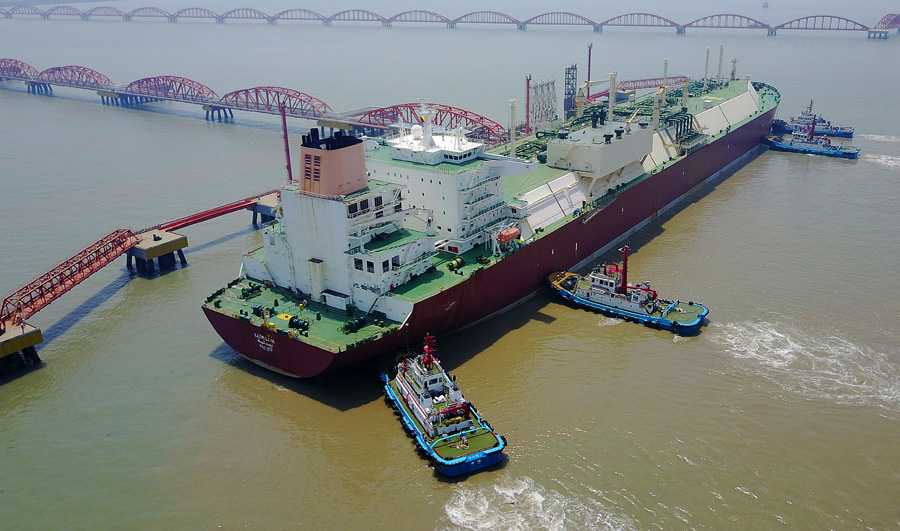China to build largest LNG carrier

An LNG carrier from Qatar berths at a receiving station in Jiangsu province. Typically, the carrier unloads 260,000 cubic meters of liquefied natural gas at the wharf. [Photo by Xu Congjun/For China Daily]
Vessel to help quench nation's growing thirst for clean fuel amid green push
China is building the world's largest liquefied natural gas carrier with a capacity of 270,000 cubic meters to cope with the rising demand for the clean fuel in the nation, a top shipbuilder said on Tuesday.
Shanghai-based Hudong-Zhonghua Shipbuilding (Group) Co Ltd, a shipbuilding unit of China State Shipbuilding Corporation has joined hands with Norway-based internationally accredited registrar and classification society DNV-GL for construction of the carrier, company officials said during the 19th International Conference &Exhibition on Liquefied Natural Gas in Shanghai.
Under the agreement, research and development work on the new vessel is set to be completed by the end of 2020. The two sides decided to go in for a supersized LNG carrier to account for the increasing clean fuel demand in the nation. Other reasons for using large-sized carriers was the limited number of LNG terminals in China's coastal cities, long-haul voyages and the need to transport fuel in chilled containers.
Coinciding with China's growing demand for LNG is its industry prowess. The nation has been selected to host the 19th International Conference &Exhibition on Liquefied Natural Gas that started on Tuesday in Shanghai. It was also the first time in the event's 50-year history that it has been held in China.
The triannual industrial meet, also known as the LNG2019, is expected to draw more than 240 international speakers across four days, attracting heads of major companies in the global LNG market.
"This year, China will be the world's leading importer of natural gas," said Mike K Wirth, chairman and chief executive officer of US-based Chevron Corp, adding that the nation will continue to boost LNG imports over the next two decades.
China imported more than 53 million tons of LNG last year, reaching a new historic high by accounting for 60 percent of the total natural gas imports, Zhang Jianhua, head of the National Energy Administration told Jiemian.com in a recent interview.
According to Zhang, companies across the world are working closely to further augment the delivery processes, storage capacities and handling facilities for the clean fuel.
Speaking at the conference, Yang Hua, chairman of China National Offshore Oil Corp (CNOOC), said: "Spring is round the corner for the global LNG industry … Natural gas will play an important role in China's energy production and consumption with LNG being an important source."
China has built 21 LNG receiving terminals across the nation, with an annual receiving capacity of 80 million tons. Out of this, CNOOC accounts for 10 receiving terminals with a combined capacity of 45.2 million tons.
Till date, more than 230 million tons of LNG has been imported, making China an important contributor in the global LNG industry's development and prosperity, he said.
Cross-border reform is taking place in the natural gas sector, including market-oriented reform, transparency and improved infrastructure, said Liu Zhongyun, vice-president of Sinopec Group.
Wang Yilin, chairman of China National Petroleum Corp, said the natural gas sector should strive for sustainable development through more affordable pricing strategies and improved, flexible trading conditions.
Darren W. Woods, chairman and chief executive officer of US-based ExxonMobil Corp, said China is the apt destination for holding the prestigious LNG2019.
"This year the event takes place in a country that is critical for the global LNG trade, a consumer. A consumer that is known … as 'a market that has decisive importance' … and what I believe is becoming even more decisive and more important every day. China after all is one of the fastest-growing LNG markets in the world and that should not surprise anyone familiar with the country's remarkable economic expansion," said Woods.


 +86-13460933678
+86-13460933678